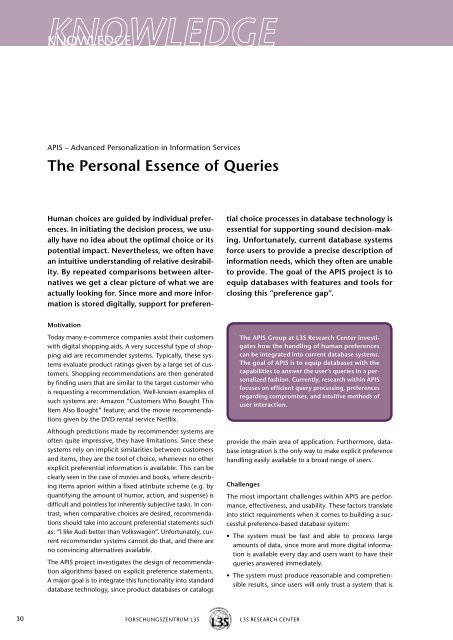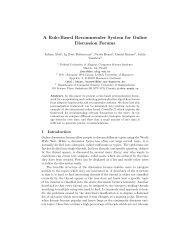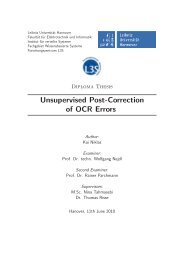knowledge · information · learning - Forschungszentrum L3S
knowledge · information · learning - Forschungszentrum L3S
knowledge · information · learning - Forschungszentrum L3S
You also want an ePaper? Increase the reach of your titles
YUMPU automatically turns print PDFs into web optimized ePapers that Google loves.
30<br />
KNOWLEDGE<br />
APIS – Advanced Personalization in Information Services<br />
The Personal Essence of Queries<br />
Human choices are guided by individual preferences.<br />
In initiating the decision process, we usually<br />
have no idea about the optimal choice or its<br />
potential impact. Nevertheless, we often have<br />
an intuitive understanding of relative desirability.<br />
By repeated comparisons between alternatives<br />
we get a clear picture of what we are<br />
actually looking for. Since more and more <strong>information</strong><br />
is stored digitally, support for preferen-<br />
Motivation<br />
Today many e-commerce companies assist their customers<br />
with digital shopping aids. A very successful type of shopping<br />
aid are recommender systems. Typically, these systems<br />
evaluate product ratings given by a large set of customers.<br />
Shopping recommendations are then generated<br />
by finding users that are similar to the target customer who<br />
is requesting a recommendation. Well-known examples of<br />
such systems are: Amazon “Customers Who Bought This<br />
Item Also Bought” feature; and the movie recommendations<br />
given by the DVD rental service Netflix.<br />
Although predictions made by recommender systems are<br />
often quite impressive, they have limitations. Since these<br />
systems rely on implicit similarities between customers<br />
and items, they are the tool of choice, whenever no other<br />
explicit preferential <strong>information</strong> is available. This can be<br />
clearly seen in the case of movies and books, where describing<br />
items apriori within a fixed attribute scheme (e.g. by<br />
quantifying the amount of humor, action, and suspense) is<br />
difficult and pointless for inherently subjective tasks. In contrast,<br />
when comparative choices are desired, recommendations<br />
should take into account preferential statements such<br />
as: “I like Audi better than Volkswagen”. Unfortunately, current<br />
recommender systems cannot do that, and there are<br />
no convincing alternatives available.<br />
The APIS project investigates the design of recommendation<br />
algorithms based on explicit preference statements.<br />
A major goal is to integrate this functionality into standard<br />
database technology, since product databases or catalogs<br />
FORSCHUNGSZENTRUM <strong>L3S</strong> <strong>L3S</strong> RESEARCH CENTER<br />
tial choice processes in database technology is<br />
essential for supporting sound decision-making.<br />
unfortunately, current database systems<br />
force users to provide a precise description of<br />
<strong>information</strong> needs, which they often are unable<br />
to provide. The goal of the APIS project is to<br />
equip databases with features and tools for<br />
closing this “preference gap”.<br />
The APIS group at <strong>L3S</strong> Research Center investigates<br />
how the handling of human preferences<br />
can be integrated into current database systems.<br />
The goal of APIS is to equip databases with the<br />
capabilities to answer the user’s queries in a personalized<br />
fashion. Currently, research within APIS<br />
focuses on efficient query processing, preferences<br />
regarding compromises, and intuitive methods of<br />
user interaction.<br />
provide the main area of application. Furthermore, database<br />
integration is the only way to make explicit preference<br />
handling easily available to a broad range of users.<br />
Challenges<br />
The most important challenges within APIS are performance,<br />
effectiveness, and usability. These factors translate<br />
into strict requirements when it comes to building a successful<br />
preference-based database system:<br />
• The system must be fast and able to process large<br />
amounts of data, since more and more digital <strong>information</strong><br />
is available every day and users want to have their<br />
queries answered immediately.<br />
• The system must produce reasonable and comprehensible<br />
results, since users will only trust a system that is















